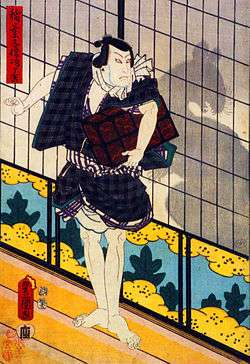Nezumi Kozō

New Year day, 4th year of Ansei (Feb, 1857) at the first play of "Yedo Ichimura-za", Nezumi komon haruno shingata(鼠小紋東君新形), drawn by Utagawa Toyokuni II[1]
Nezumi Kozō (鼠小僧) is the nickname of Nakamura Jirokichi (仲村次郎吉, 1797 - 1831), a Japanese thief and folk hero who lived in Edo (present-day Tokyo) during the Edo period.[2]
Capture and tattoo
In 1822, he was caught and tattooed, and banished from Edo. On August 8, 1831, he was captured again, and confessed to the burglary of over 100 samurai estates and the impressive theft of over 30,000 ryō throughout his 15-year career. He was tied to a horse and paraded in public before being beheaded at the Suzugamori execution grounds. His head was then publicly displayed on a stake. He was buried at Ekō-in located in the Ryōgoku section of Tokyo. So many pilgrims chip away pieces of his tombstone for charms that substitute stones have had to be constructed since shortly after his death.[2]
Background
At the time of the arrest, Jirokichi was found to have very little money. This, combined with the public humiliation he dealt out to the daimyo, resulted in the popular legend that he gave the money to the poor, turning the petty crook into a posthumous folk hero similar to Robin Hood. The fact that he died alone, serving his wives with divorce papers just prior to arrest in order to protect them from sharing in the punishment as the law decreed, further enhanced his stature.
Nickname
Jirokichi's nickname, Nezumi Kozō, is not a name. Nezumi is the Japanese word for "rat"; a kozō was a young errand-boy who worked in a shop in the Edo period. The nickname can thus be roughly translated as "rat boy". Since a nickname containing the term kozō was often given to pickpockets, who were often young boys and girls since the profession required nimble fingers, it has been suggested that Jirokichi was a well known pickpocket when he was younger.
In popular culture
His exploits have been commemorated in kabuki theatre, folk songs, jidaigeki, video games, and modern pop culture. See more in the Japanese historical people in popular culture article.